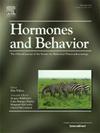食用乳化剂增加小鼠对社会压力的敏感性:COX分子途径的潜在作用
IF 2.4
3区 医学
Q2 BEHAVIORAL SCIENCES
引用次数: 0
摘要
慢性低度炎症和应激暴露是许多神经精神疾病的病因和进展的关键因素。膳食乳化剂,如羧甲基纤维素(CMC)和聚山梨酸酯-80 (P80),通常添加到加工食品和饮料中,并被食品和药物管理局(FDA)归类为公认安全(GRAS)。然而,最近,我们和其他人报道了这些添加剂在翻译相关剂量下导致低级别肠道炎症、微生物群失调和大脑区域基因表达的改变,这些区域介导对应激刺激的行为和神经内分泌反应。方法以C57BL/ 6j雄性小鼠为实验对象,分别给予水+ 1%乳化剂(CMC或P80)或单独水12周,观察乳化剂暴露对应激行为、激素和神经元反应的增敏作用。我们之前发现,食用乳化剂后,杏仁核中PTGS2 (COX-2)基因表达增加。为了确定炎症(可能通过COX途径)是否是驱动乳化剂诱导的应激敏感性增加的潜在机制,我们在治疗的最后六周将COX抑制剂阿司匹林(25 mg/kg/天)与乳化剂联合使用。结果在失败小鼠中,CMC增加了循环皮质酮,而两种乳化剂均增加了社交回避行为,并改变了失败诱导的各脑区c-Fos免疫荧光。此外,阿司匹林可以减轻行为和激素的改变。这些数据表明,至少摄入一些与人类摄入浓度相似的膳食乳化剂会增加小鼠对社会压力的敏感性,并且COX途径可能是乳化剂诱导的社会压力敏感性增加的一个机制候选。本文章由计算机程序翻译,如有差异,请以英文原文为准。
Consumption of dietary emulsifiers increases sensitivity to social stress in mice: A potential role for the COX molecular pathway
Background
Chronic low-grade inflammation and exposure to stress are key contributing factors in the etiology and progression of many neuropsychiatric disorders. Dietary emulsifiers, such as carboxymethylcellulose (CMC) and polysorbate-80 (P80), are commonly added to processed foods and drinks and are classified by the Food and Drug Administration (FDA) as generally recognized as safe (GRAS). Recently, however, we and others have reported that these additives at translationally relevant doses cause low-grade intestinal inflammation, microbiota dysbiosis, and alterations in gene expression in brain areas that mediate behavioral and neuroendocrine responses to stress-provoking stimuli.
Methods
To test whether emulsifier exposure sensitizes behavioral, hormonal, and neuronal responses to stress, C57BL/6 J male mice were given water +1 % emulsifier (CMC or P80) or water alone for 12 weeks after which they were exposed to social defeat stress. We previously found increased PTGS2 (COX-2) gene expression in the amygdala following emulsifier consumption. To determine whether inflammation, potentially through the COX pathway, is a potential mechanism driving emulsifier-induced increases in stress sensitivity, we administered the COX inhibitor aspirin (25 mg/kg/day) in conjunction with emulsifiers for the last six weeks of treatment.
Results
In defeated mice, CMC increased circulating corticosterone, while both emulsifiers increased social avoidance behavior and altered defeat-induced c-Fos immunofluorescence in various brain regions. Moreover, behavioral and hormonal alterations were attenuated by aspirin.
Conclusions
These data demonstrate that ingestion of at least some dietary emulsifiers at concentrations analogous to those ingested by humans increases sensitivity to social stress in mice and that the COX pathway may be a mechanistic candidate by which emulsifier-induced increases in sensitivity to social stress occur.
求助全文
通过发布文献求助,成功后即可免费获取论文全文。
去求助
来源期刊

Hormones and Behavior
医学-行为科学
CiteScore
6.70
自引率
8.60%
发文量
139
审稿时长
91 days
期刊介绍:
Hormones and Behavior publishes original research articles, reviews and special issues concerning hormone-brain-behavior relationships, broadly defined. The journal''s scope ranges from laboratory and field studies concerning neuroendocrine as well as endocrine mechanisms controlling the development or adult expression of behavior to studies concerning the environmental control and evolutionary significance of hormone-behavior relationships. The journal welcomes studies conducted on species ranging from invertebrates to mammals, including humans.
 求助内容:
求助内容: 应助结果提醒方式:
应助结果提醒方式:


